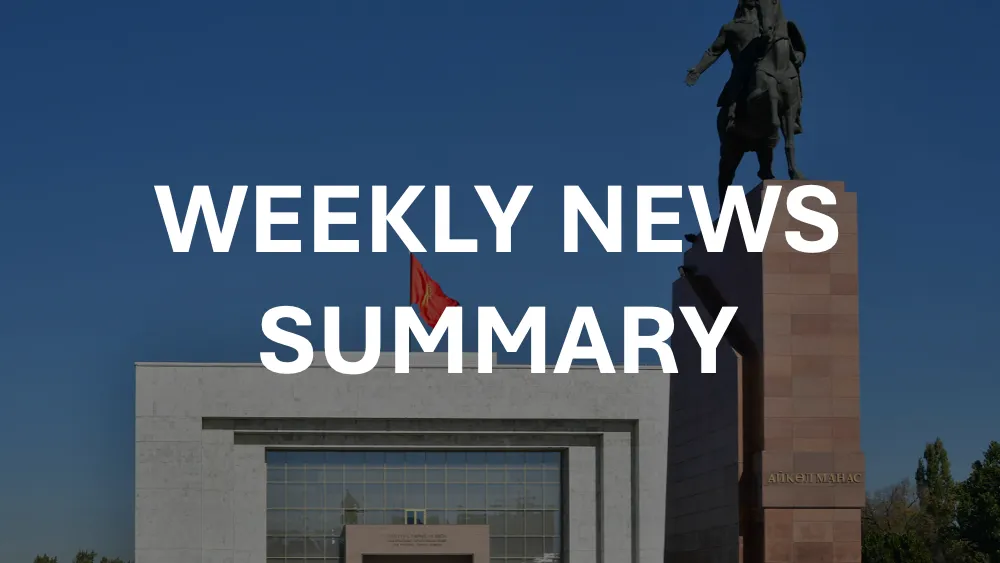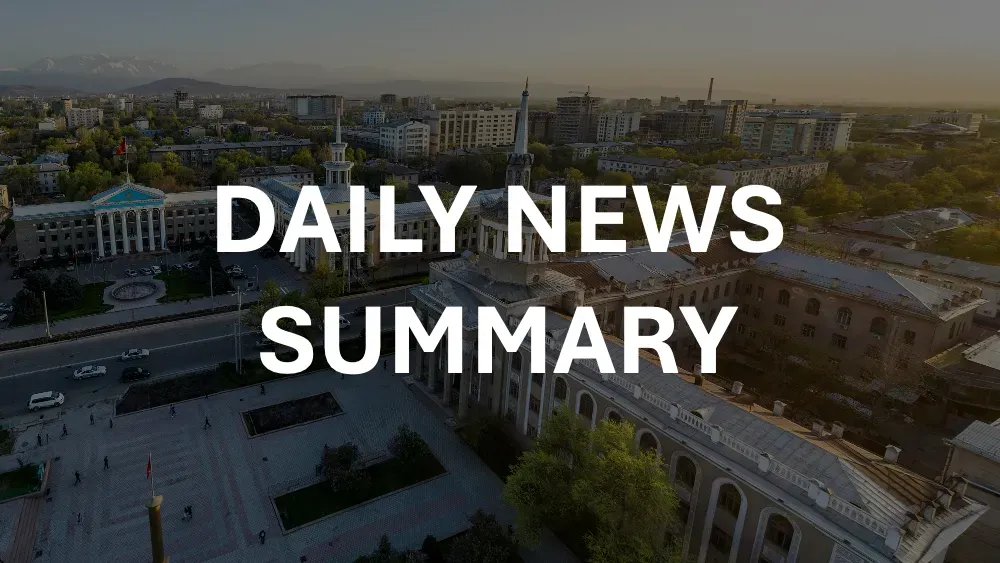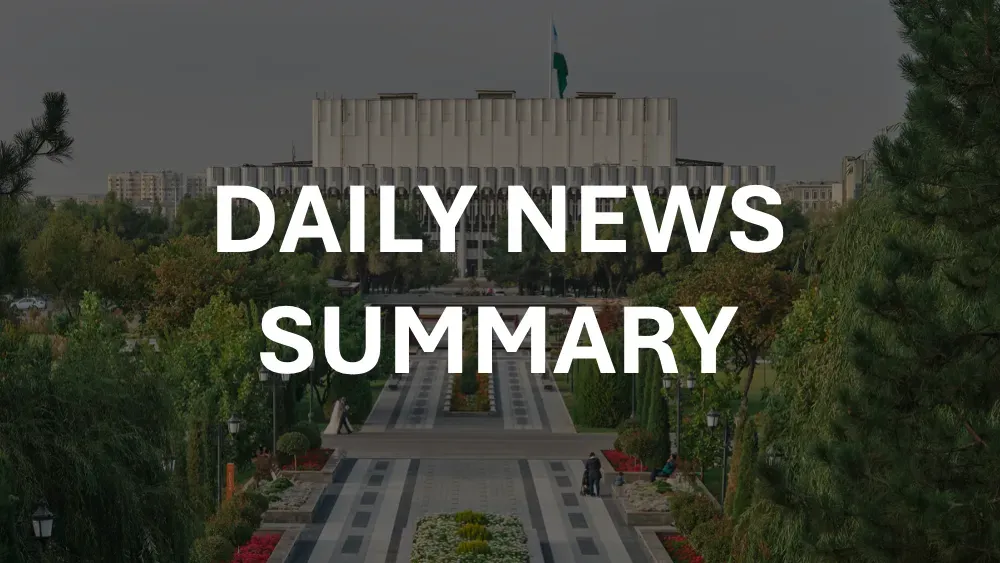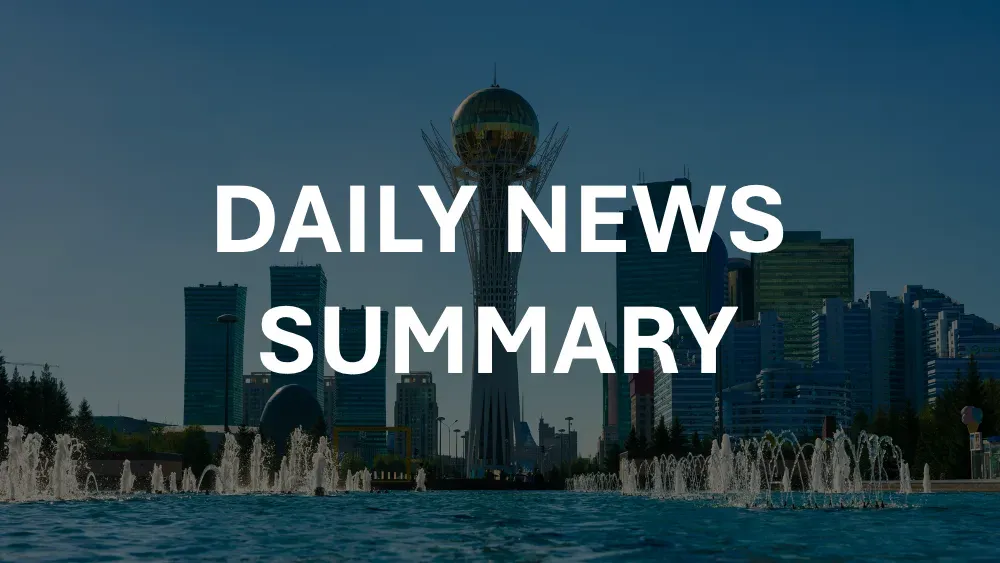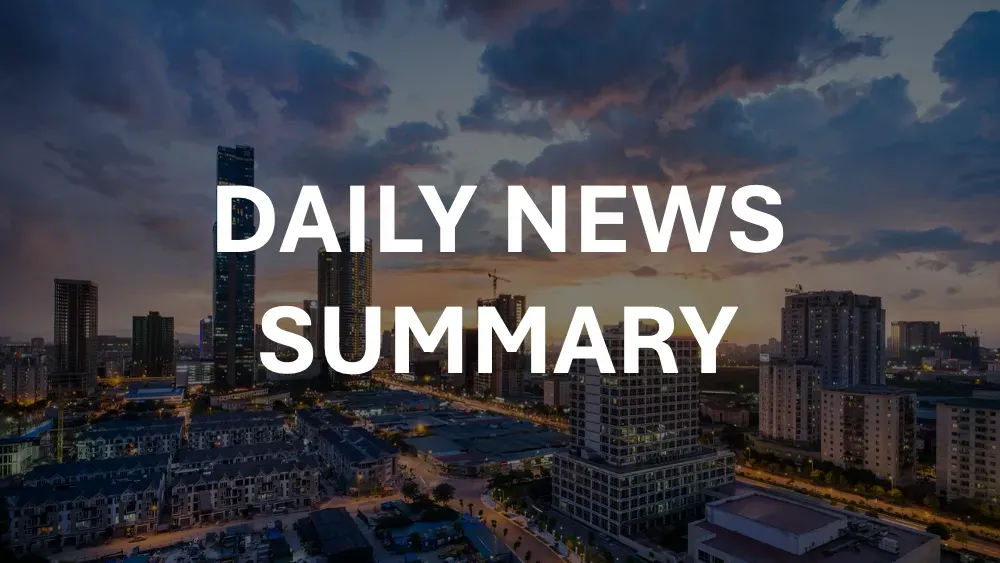This weekly digest showcases just 10 stories. Daily subscribers receive comprehensive intelligence briefs with 40 of the top stories organized by category. Don't miss the stories that matter.
Subscribe to Daily →
August 15, 2025 to August 21, 2025
This week's top 10 stories from Kyrgyzstan, selected from our daily intelligence briefs.
1. Tokayev to Pay Official Visit to Bishkek for Intergovernmental Council, Monument Unveiling and New Consulate Opening
Kazakh President Kassym-Jomart Tokayev will make an official visit to Bishkek on 21 August to meet Kyrgyz leaders in a narrow format and attend the 7th session of the Supreme Interstate Council, focusing on bilateral cooperation in trade, connectivity, education and cultural ties. The agenda includes discussions on “pressing issues of bilateral cooperation” and the future trajectory of Kyrgyz–Kazakh relations following Tokayev’s previous Bishkek visit in May 2022 and Kyrgyz President Sadyr Japarov’s April 2024 trip to Astana.
Symbolic and practical deepening of relations will be highlighted by a joint inauguration of the “Golden Bridge of Friendship” in Yntymak Park, the opening of Kazakhstan’s Consulate General and a branch of L.N. Gumilyov Eurasian National University in Osh, and cultural initiatives such as Kazakhstan Film Days and the 3rd Kyrgyz–Kazakh Youth Forum. These moves underscore an emphasis on people-to-people links and regional connectivity that could translate into expanded educational exchanges, subnational economic ties and enhanced cross-border infrastructure cooperation.
From daily brief: 2025-08-21
2. State Firm Gains Exclusive Control Over International Internet Traffic
Kyrgyzstan has granted exclusive rights for delivery, distribution and transit of international internet traffic to state-owned Elcat, creating a government monopoly over cross‑border connectivity. The policy centralizes routing under a single operator with stated aims of tightening control over international links and improving security/compliance; reporting ties the move to decisions made this year (see Azattyk coverage).
For international businesses and private ISPs the change raises immediate concerns about resilience, pricing power and service quality: redundancy and latency‑sensitive services may be affected if Elcat curtails parallel international links or wields wholesale-rate leverage. The shift could also create regional transit opportunities if Elcat positions Kyrgyzstan as a corridor, but outcomes will depend on Elcat’s operational capacity, transparency in interconnection agreements and the strength of regulatory oversight to prevent bottlenecks and preserve network openness.
From daily brief: 2025-08-21
3. Analyst Warns of Rising Water Conflict Risk in Central Asia as Afghanistan Expands Qosh-Tepa Canal
Kyrgyz academic Nurbek Omuraliev, head of the Social Research Center at the National Academy of Sciences and co-chair of the Eurasian Analytical Forum’s organizing committee, warned on Aug. 19 that Afghanistan’s unilateral construction of the Qosh‑Tepa canal on the Amu Darya raises the risk of heightened transboundary water tensions in Central Asia. Omuraliev said Afghanistan did not consult downstream neighbors and that the canal could “leave Uzbekistan and Turkmenistan’s lower reaches almost without water,” stressing that Kyrgyzstan’s current glacier buffer is temporary and urging immediate conservation measures and coordinated regional water policy.
Omuraliev framed the water dispute within broader regional stability dynamics, arguing that clarified borders and reduced interstate clashes would strengthen cross‑border ties and economic links; he noted recent Kyrgyz progress on frontier settlements as positive in that regard. For international professionals, the development signals a growing need for multilateral water governance mechanisms, rapid diplomatic engagement with Kabul, and investment in adaptation measures across Uzbekistan, Turkmenistan and upstream riparians.
From daily brief: 2025-08-20
4. Central Asian Leaders Consult Putin Following Anchorage Summit with Trump
Following the Aug. 2025 Anchorage summit between Presidents Vladimir Putin and Donald Trump, Uzbekistan’s Shavkat Mirziyoyev and Kyrgyzstan’s Sadyr Japarov held separate phone calls with Putin to review the meeting and coordinate policy messaging. Mirziyoyev emphasized accelerating industrial cooperation projects and strengthening trade ties with Russia, while Japarov characterized the Putin–Trump talks as “an important step toward strengthening trust and reducing global tensions,” linking improved US–Russia dialogue to prospects for a peaceful settlement in Ukraine and reaffirming Kyrgyzstan’s readiness to cooperate with Russia on regional stability and sustainable development.
The calls signal coordinated Central Asian positioning—Tashkent and Bishkek stressed continued high‑level contact with Moscow and the value of diplomacy for de‑escalation—suggesting these governments seek to preserve strong bilateral economic links with Russia while endorsing broader international dialogue. For international professionals, the exchanges indicate Central Asian capitals may act as interlocutors that amplify Russian–Western engagement outcomes into regional economic and security agendas.
From daily brief: 2025-08-19
5. Russia May Expel 91,000 Kyrgyz Nationals Listed in Monitoring Registry from September
Russian authorities may begin deporting roughly 91,000 Kyrgyz nationals listed in a federal monitoring registry starting in September, Azattyk reports. The article notes some affected migrants say children are already facing related restrictions, but provides no detail on the registry’s scope or inclusion criteria and cites no official response from Russian or Kyrgyz authorities.
If carried out, mass removals would have immediate cross-border implications: strain Kyrgyz consular capacity, disrupt remittance flows and household incomes, interrupt schooling and residency for families in Russia, and create acute labor shortages for Russian employers dependent on Kyrgyz workers. The legal recourse available to those listed remains unclear, raising risks of sudden displacement and planning challenges for policymakers and businesses in both countries.
From daily brief: 2025-08-18
6. Sexual Harassment Allegations Hit Judiciary and State Agencies as Legal Framework Lags
Kyrgyz authorities have opened criminal cases alleging “coercion to sexual acts” against a Bishkek district judge and the head of a forensic unit in Özgön amid wider reports of entrenched workplace harassment across state institutions. Officials say a Ministry of Emergency Situations employee reported repeated harassment by supervisors and retaliation after complaining; the Ombudsman’s office recorded only two formal reports of workplace sexual harassment in the past 18 months, which it attributes to social stigma and legal gaps. Supreme Court Chair Mederbek Satybaldiyev warned that some judges’ unlawful and unethical behavior is damaging the court system’s credibility.
Legal reform is underway but incomplete: Deputy Ombudsman Aichürek Nazaraliyeva noted harassment is not yet defined in Kyrgyz law, while lawyer Atyr Abdyrahmatova highlighted new labor code protections taking effect in July 2025 and urged victims to file police complaints and involve the Ombudsman. The lack of official statistics contrasts with prior research indicating about one in four women experience workplace harassment, underscoring a culture of impunity and the need for clearer legal definitions, reporting mechanisms and institutional accountability.
From daily brief: 2025-08-18
7. US Sanctions Grinex Crypto Exchange Registered in Kyrgyzstan, Citing Links to Notorious Cybercriminals
The US Treasury has designated Grinex, a cryptocurrency exchange reportedly registered in Kyrgyzstan, for sanctions, accusing the platform of collaborating with “notorious cybercriminals” and facilitating illicit finance. Reporting by the Financial Times links Grinex to Ilan Shor, the Moldova-born businessman and politician now based in Russia, who has faced multiple corruption allegations; the Treasury’s action signals intensified scrutiny of regional virtual asset service providers perceived as enablers of money laundering and sanctions evasion.
Implications for international professionals: financial institutions and crypto firms dealing with counterparties in or through Bishkek should expect enhanced due diligence, onboarding delays and reassessments of counterparty risk—particularly for US dollar flows—and potential disruptions to correspondent banking relationships. Kyrgyz authorities may face pressure to tighten oversight of VASPs to avoid reputational damage and secondary sanctions exposure.
From daily brief: 2025-08-20
8. EAEU Intergovernmental Council Convenes in Cholpon-Ata as Japarov Hosts Regional Leaders and Meets Russia’s Mishustin
Kyrgyzstan hosted the Eurasian Economic Union (EAEU) Intergovernmental Council in Cholpon-Ata, where President Sadyr Japarov on [date not specified] received prime ministers from EAEU member states and the Eurasian Economic Commission chair, with Uzbekistan and Iran attending as guests. Japarov described the EAEU as a priority for Kyrgyzstan’s external economic policy, pointing to GDP growth since accession and urging elimination of internal barriers to the free movement of goods, capital, services and labor, plus expanded joint industrial and agricultural projects targeted at smaller economies.
In a bilateral meeting, Russian Prime Minister Mikhail Mishustin underscored Russia’s status as a key trade partner for Kyrgyzstan, noting the presence of some 1,700 Russian companies operating in the country and cooperation across 80 Russian regions. Mishustin outlined forthcoming initiatives including a 12th interregional forum and construction of nine schools offering joint Russia–Kyrgyz diplomas, signaling deepening economic and educational ties that could further integrate regional markets and human capital development.
From daily brief: 2025-08-19
9. Kazakhstan Opens General Consulate in Osh, Upgrading 2012 Mission and Signaling Deeper Ties
Kazakhstan formally opened its General Consulate in Osh on 20 August, upgrading a mission first established in 2012 to full general-consulate status as of 2025. The ceremony, held on Kazakhstan’s Constitution Day, was attended by senior Kyrgyz and Kazakh officials and framed by Consul General Mukhtar Karibai as a symbolic step ahead of President Kassym-Jomart Tokayev’s planned visit to Kyrgyzstan. The consulate, located in the Residence microdistrict (6th Street, House 18), is intended to expand consular services for Kazakh nationals in southern Kyrgyzstan and to deepen economic and cultural cooperation between the two countries.
Local authorities also announced plans to name an Osh street after Kazakh poet Abai Qunanbaiuly and to develop a “Diplomatic Town,” signaling broader municipal support for stronger bilateral ties. For international professionals, the move indicates Kazakhstan’s intent to institutionalize its regional presence and facilitate people‑to‑people and commercial links in a strategically important border region ahead of high‑level diplomatic engagement.
From daily brief: 2025-08-21
10. President Japarov Defends Demolition Drive, Offers Housing via State Mortgage Company and Reaffirms Open-Door Investment Policy
Kyrgyz President Sadyr Japarov defended recent demolition campaigns in Bishkek and Osh, saying the government has legalized homes built before 2021 but will not regularize post‑2021 constructions to protect agricultural land and curb collusion between local officials and fraudsters; he said prosecutions have followed. Japarov ordered mayors to ensure displaced residents are rehoused, prioritizing those with no alternatives through the State Mortgage Company, and cited a negotiated solution at Bishkek’s Atatürk Park—where residents agreed to fund about 500 million som in upgrades—to avoid forced removals.
Responding to questions about links to sanctioned Moldovan politician Ilan Shor, Japarov denied any role in sanctions evasion and reiterated an open‑door investment policy, saying “Anyone—whether Ilan Shor or Ilon Musk—may come to invest; our doors are open.” The statements signal a dual strategy of tightening land‑use enforcement while maintaining a pro‑investment stance, with potential domestic political risks tied to displacement and international scrutiny over investor vetting.
From daily brief: 2025-08-19
These weekly highlights are a small sample of what's happening. Daily subscribers get comprehensive briefings with 40 top stories that connect the dots between events, track developing stories, and provide the context you need for informed decision-making.
Upgrade to Daily →


